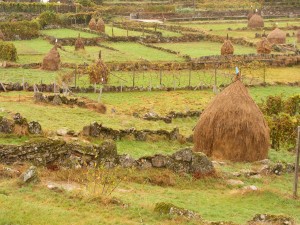Portugal is a country of strong contrasts. It’s, today, a country with a vast over urbanized sea-coast, and with a mostly inhabited interior.
But, and that what I find more interesting, iit’s a country with villages very closed (every house is built next to another house), and villages where every house have it’s own space.
Even for those who know Portugal, this may be one aspect that get’s unnoticed for a long time. And for those few who notice this, most don’t really know/understand why there are this difference between villages anatomy. It’s even more interesting when you notice that two villages close by – across a small river one from the other, for instance – can have this curious difference in construction.
But, when you notice that the villages are different, you may as well start noticing that the way the terrain around the villages are split is also different. Usually you will find the closed villages surrounded by a small number of large properties, usually two or three properties at most. Now, with time, you may find some more properties, but still large ones. On the spaced villages, on the other hand, you will find a large number of very small and smallish properties. On this smaller properties you will not even had most time physical divisions between the properties. You just notice they are different properties because the type of plants growing there are different, or the direction used when plating/seed the fields are different and the height on the plants are different (because they were seeded in different weeks, or are watered with different frequencies).
And then you start to notice that the bigger properties and the closer villages are on more plane terrains than the smaller properties and spaced villages. And when you remember that Portugal is the older country in Europe, with fixed frontiers for more than 750 years now, and with only 4 dynasties for more than 800 years (this last 100 years we have living in mostly unstable governments), you finally understand where this topology comes from.
The close villages where villages of people who worked for a landlord, a noble, who owned the land, and that allowed the land workers to create their own houses in a specific location inside the property. On the other hand, the spaced villages were villages of freemen, who had their own lands, that they were authorized to buy and sell between them, and that they could let to their children.
But, the main difference is that while nobles would transmit all their lands to their first male son, the freemen would give their lands to all their children, male and female. And that’s why the properties are so small. That’s why most people would have several small(ish) pieces of land in different places around the village – most of the time side by side with a brother/sister’ piece of land.
And, in these villages there were usually a few men that would travel a lot, buy and selling everything the village did produce and didn’t need, and buy what the village weren’t able to produce enough for they needs. And that’s why families stayed together most of the time – making houses side by side whenever possible, so that the wifes and children that were left alone would have the help from the family.
That’s why, in those spaced villages of freemen you don’t only find some isolated houses, but most of the time you find what seems to be like large and unplanned houses, but are really several small houses built together in different time and with different dimensions – depending on the family building it.
I did grow in one of those villages of freemen. My grandmother – my father’s mother was the really owner of the house, her house was built over her parents house, and next door her sister was the matriarch. Not all my uncles lived there, but most did at some time. My grandmother and grandfather lived in one of the house in the agglomerate, my parent – with me and my sister – lived in another of the houses, one of my uncles, his wife and daughter lived in the top floor of a third house, under which we had a space connecting the three houses and used as a straw barn and cellar.
The common backyard of this three houses was also were the chicken (ducks and turkeys at time also) were most of the time, and how we had access to the animals corrals. Another of my uncles were studding in a near by city and would come home most weekends. From those closed backyard (created, I think, because of the kids – us) you would get access to a larger backyard where some of the daily food would come from – green beans, some potatoes, peas, sprouts and some other things. That and meat from the pigs, sheep, chicken, duck and turkeys were most of our food supply.
The larger backyard was shared with my grandmother’ sister – well, they were two different properties, one in each side of a line starting in the well shared by both properties. And it was one of the ways we used to go from one house to the other – most of the time my cousins – the grandchildren of my grandmother’s sister – coming to our side, don’t ask me way, I’m not really sure, but I guess that’s because we had more space where we could play in our side.
We were, I guess, just a poor happy big family. And that is my bless, and that is my curse. Those times are long gone, and I don’t really believe I will ever again have a big happy family like that! And that’s why I’ll never really miss anything else!
